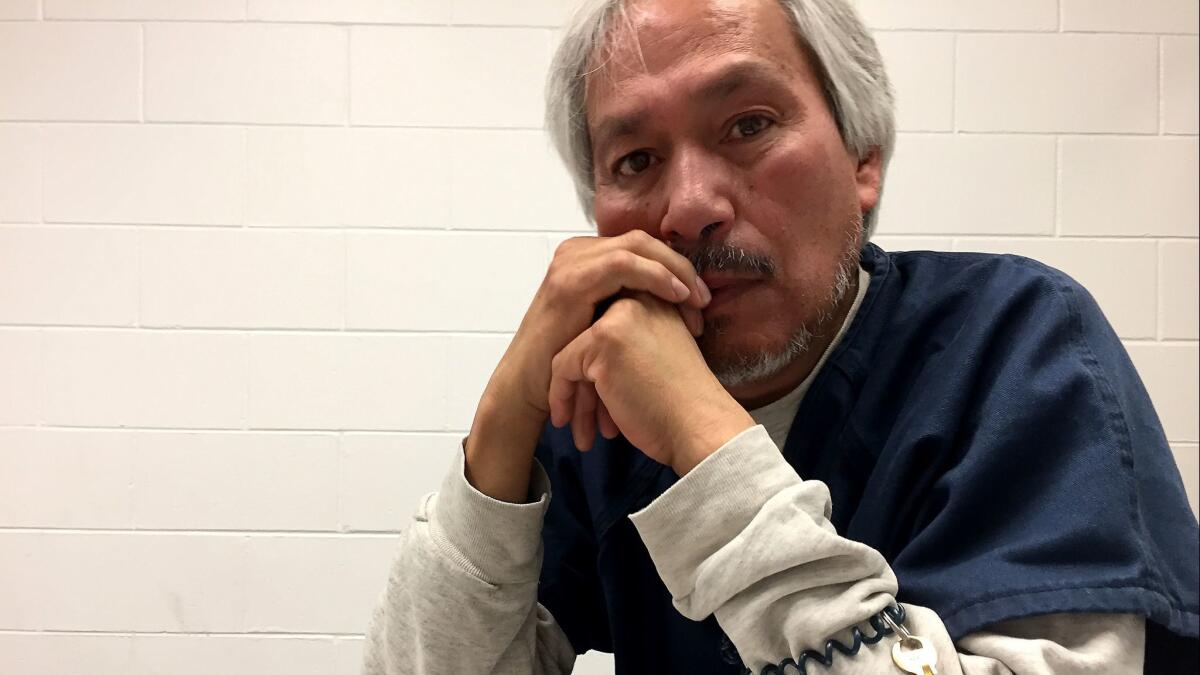Lawyers for Mexican journalist blame his detention in the U.S. on Trump’s ‘anti-Mexican bias’

- Share via
Reporting from Mexico City — Lawyers for a Mexican journalist being held in a U.S. immigrant detention center are demanding his release, saying President Trump’s frequent attacks on Mexicans and journalists are evidence that the man is a victim of discrimination.
In a writ of habeas corpus filed in a Texas district court Tuesday, lawyers for the journalist, Emilio Gutierrez Soto, said he and his son, who is also being detained, should be immediately released because their detention violates the equal protection clause of the Constitution.
“We have a president who, throughout his entire campaign and since he’s been in office, has vilified Mexicans on almost a daily basis, calling them rapists, calling them criminals,” attorney Penny Venetis said at a news conference at the National Press Club in Washington, D.C. “We are using his statements to show that there is an anti-Mexican bias throughout the administration, and especially in the immigration system.”
Venetis said Trump’s comments disparaging journalists, whom he has called “lying, disgusting people” and “an enemy of the American people,” are further evidence of discrimination against Gutierrez.
A former reporter for a small newspaper in the violent state of Chihuahua, Gutierrez said he fled Mexico with his then-15-year-old son a decade ago after he received death threats in connection to a series of articles he had written alleging military corruption. Gutierrez asked for asylum at the border, telling a border agent: “We’re not afraid; we’re terrified.”
He and his son were eventually released on parole while they waited for their asylum case to be heard. For several years, they lived in Las Vegas, N.M., where Gutierrez operated a food truck. In November, their asylum claim finally came before a judge. It was denied. The pair were detained and about to be deported when the Board of Immigration Appeals agreed to reconsider their case.
Instead of paroling them, as is often the case when detainees don’t pose a risk, federal agents have kept Gutierrez and his son in detention in El Paso for nearly three months.
According to the National Press Club, which has sought to bring attention to the case, Immigration and Customs Enforcement officials have deemed Gutierrez and his son a flight risk. Their lawyers say that’s not true, pointing out that during the decade they were on parole, Gutierrez and his son never missed an immigration appointment.
“In the U.S. you can’t be thrown into jail if you haven’t done anything wrong,” Venetis said.
She said the unique legal argument laid out in Tuesday’s filing is backed up by a recent decision by the U.S. 4th Circuit Court of Appeals, which stuck down one of Trump’s executive orders seeking to limit travel from several Muslim-majority countries. The court found the order was “unconstitutionally tainted with animus toward Islam,” and said a series of tweets and statements from Trump calling for a ban on Muslim immigration was evidence of discriminatory intent.
Legal experts were divided on whether lawyers in the Gutierrez case would be able to prove discriminatory intent. Douglas Kmiec, a professor of constitutional law at Pepperdine University, said their argument has “some plausibility,” especially given the recent court decision on the travel ban.
“If there have been irregular aspects of his detention … that type of behavior or policy being followed might well be in conjunction with public statements made by the president,” Kmiec said. But, he said, “It would be hard to demonstrate that the president has put into place policies equivalent to the travel ban targeting journalists or journalists of a specific nationality.”
Josh Blackman, a professor of constitutional law at the South Texas College of Law in Houston, said it would be difficult for lawyers to prove a discriminatory intent because Trump has never spoken out directly about Gutierrez or cases like his.
“I have a very tough time seeing this prevailing,” Blackman said of the case. “Otherwise, every single Mexican in detention would have a get-out-of-jail card.”
The lawsuit, which asks that Gutierrez and his son be released while the appeals court considers their case, includes statements from a psychologist who said Gutierrez is suffering from depression and physical harm in detention, where he has not been able to receive medication for high blood pressure and cholesterol. The lawsuit also argues that Gutierrez may be killed if he is sent back home. At least 11 journalists were killed in Mexico last year in a wave of anti-media violence that the United Nations has called “endemic.”
The U.S. government has acknowledged the danger faced by journalists in Mexico. U.S. Ambassador Roberta Jacobson has pressured Mexican authorities to do more to investigate killings and has expanded safety training sessions for local journalists. Last month, Deputy Assistant Secretary of the State Department Scott Busby sent a letter describing the dangers Mexican journalists face to the appeals court hearing Gutierrez’s case.
Mexico was the world’s most dangerous country for journalists outside of a war zone in 2017, Busby’s letter said, noting that “perpetrators of violence against journalists continued to act with impunity, with few reports of successful investigation, arrest or prosecution of suspects.”
Lawyers for Gutierrez said statements such as those show a stark disconnect within the government.
“You have one arm of the government that is detaining Mexicans and you have another arm saying, ‘Look, there is a real fear here that this guy is going to be killed,’” Venetis said.
To read this article in Spanish click here
Twitter: @katelinthicum
More to Read
Sign up for Essential California
The most important California stories and recommendations in your inbox every morning.
You may occasionally receive promotional content from the Los Angeles Times.













